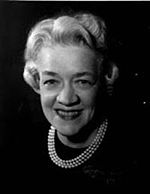- Declaration of Conscience
-
The Declaration of Conscience was a speech made by Senator Margaret Chase Smith on June 1, 1950, less than four months after Senator Joe McCarthy's infamous "Wheeling Speech," on February 9, 1950. It also refers to the text of the speech itself, which was endorsed by six other moderate/liberal Republicans. In it, she criticized national leadership and called for the country, the United States Senate, and the Republican Party to re-examine the tactics used by the House Un-American Activities Committee (HUAC) and (without naming him) Senator Joe McCarthy. She stated the basic principles of "Americanism" were:
- The right to criticize;
- The right to hold unpopular beliefs;
- The right to protest;
- The right of independent thought.
Smith strongly voiced concern that those who exercised those beliefs at that time risked being labeled communist or fascist.
In the Declaration of Conscience, Smith said,
- "The Democratic administration has greatly lost the confidence of the American people by its complacency to the threat of communism and the leak of vital secrets to Russia through key officials of the Democratic administration. There are enough proved cases to make this point without diluting our criticism with unproved charges.
- Surely these are sufficient reasons to make it clear to the American people that it is time for a change and that a Republican victory is necessary to the security of this country. Surely it is clear that this nation will continue to suffer as long as it is governed by the present ineffective Democratic Administration.
- Yet to displace it with a Republican regime embracing a philosophy that lacks political integrity or intellectual honesty would prove equally disastrous to this nation. The nation sorely needs a Republican victory. But I don't want to see the Republican Party ride to political victory on the Four Horsemen of Calumny -- Fear, Ignorance, Bigotry and Smear.
- I doubt if the Republican Party could -- simply because I don't believe the American people will uphold any political party that puts political exploitation above national interest".
The other Senators who signed onto the Declaration were Wayne Morse of Oregon, George Aiken of Vermont, Edward Thye of Minnesota, Irving Ives of New York, Charles Tobey of New Hampshire, and Robert C. Hendrickson of New Jersey. While the initial reception was chilly, the full-fledged outbreak of the Korean War on June 25, 1950 removed any hope that Smith's views would prevail, as Republican candidates ran hard across the land that year on precisely the sort of accusations of disloyalty and treachery that Smith had condemned. The only signatory whose outrage remained undimmed was Wayne Morse, who eventually left the party, first becoming an independent, then a Democrat.
Although it would be another four years before the tides turned and McCarthy was censured, the fact that a woman was the first to speak out in the Senate against McCarthy and his tactics holds significance for feminist historians. In 1997, the Republican conference appointed Susan Collins of Maine as the first woman to chair the Senate Permanent Subcommittee on Investigations; Collins holds Smith's Senate seat.
External links
Categories:- Anti-communism in the United States
- Speeches
- McCarthyism
- 1950 in the United States
Wikimedia Foundation. 2010.

